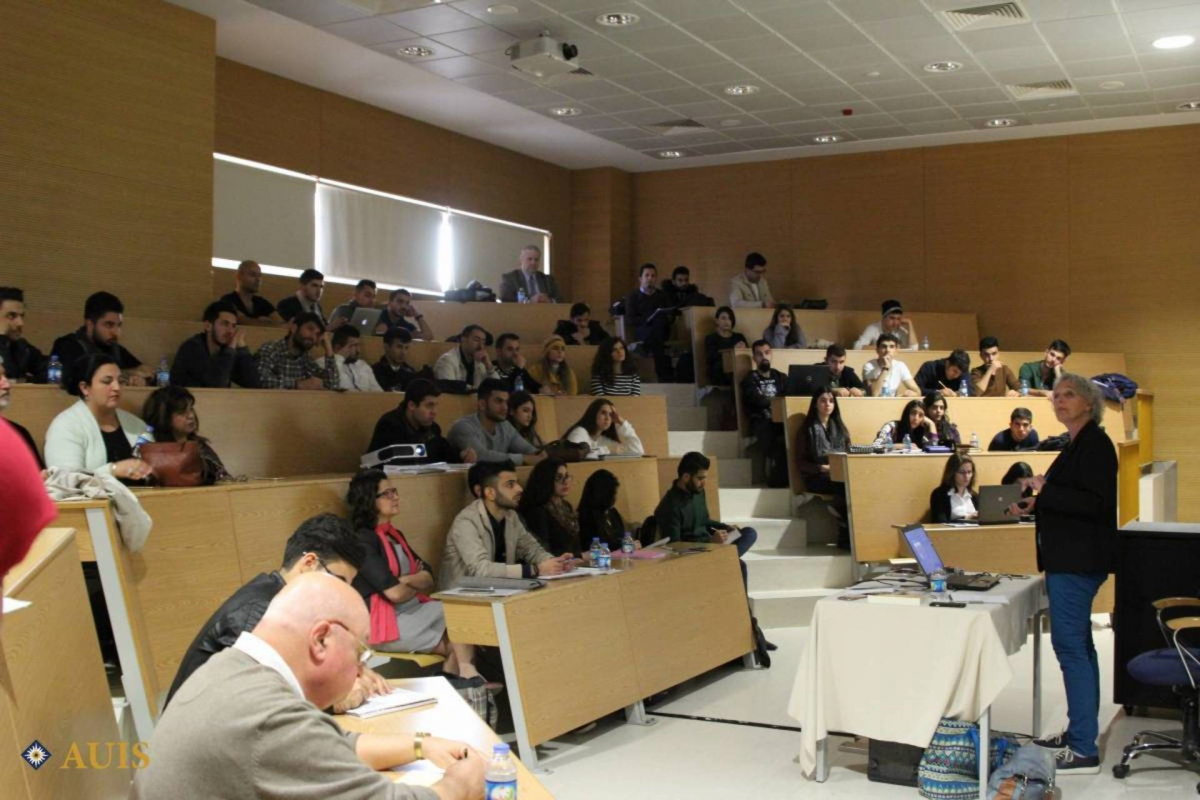
On November 27th, 2016, the Center for Gender and Development Studies (CGDS) at AUIS hosted a lecture by Judit Neurink, journalist and author from the Netherlands. This launched the 16 Days of Activism Against Gender-based Violence campaign during which CGDS shared several profiles of successful women on social media. The videos were made by members of the Action Group (TAG), a student club supervised by CGDS director Dr. Choman Hardi. The purpose of the films is to highlight women’s contribution to the region’s art, culture, politics, and economy and to reinforce that if women are supported and given the same opportunity, they too will achieve great things.
As a specialist on the Middle East who has been living and working in Iraqi Kurdistan for the past eight years, Neurink focused the lecture discussing her newly published book titled: The Women of the Caliphate: slaves, mothers, and Jihadi brides. ISIS atrocities against the Ezidi women captured during the fall of Sinjar, led Neurink to write her book on the relationship between ISIS extremism and women. Throughout the lecture, she illustrated a broader picture of how ISIS ideology and practice perceive local Muslim and non-Muslim women as opposed to foreign converted women.
Listen to the podcast here:
ISIS and Ezidi Slave Girls

Neurink started her remarks on ISIS’s systematic atrocities against Ezidi women. Approximately 6000 Ezidis were kidnapped and only 3000 have so far been rescued. As soon as ISIS captured the women, they publically put them on sale in their slave markets for different prices depending on age and beauty, she noted. Over the past two years prices enormously went up from 100 USD (per person) to 30,000 USD. As a matter of fact, some Ezidi families bought off their girls from ISIS when they saw advertisements on ISIS’s twitter and webpage. Others survived ISIS slavery through escaping via PYD and PKK network from Syria. Women’s rehabilitation began by going through the Ezidi religious practices of confession and purification after a declaration from Ezidi religion leader, Baba Sheikh, who urged the community to welcome back the women. Neurink also explained that escape was a bit easier in the beginning, but this is no longer the case as ISIS fighters took the Ezidi girls with them after being pushed out of Sinjar.
Women and Sexuality
Neurink further shed light on ways in which ISIS perceive women and sexuality, given their ideology. According to Islamic law, men and women are not allowed to engage in sexual relationships outside the legal framework of marriage. She demonstrated examples in which ISIS fighters made exceptions for being with girls without marriage by declaring the women as their slaves. She highlighted the example of the well-known Jihadi bride, Umm Summaya Al-Muhajirrah, who simply justified ISIS sex slave ideology claiming that is a way to prevent prostitution. Neurink further stressed that ISIS even gave slave girls as prizes during Ramadan for those who memorized recitations from Quran and Hadith.
Women Fighter, Recruitment, and Indoctrination

Having mentioned that women’s participation in fighting is not usual in Middle Eastern and Islamic culture, yet ISIS has managed to recruit many women fighters into their Caliphate. A sisterhood security force has been established titled Al-Khansa Brigades whose major task is to deliver brutal punishment to women who go out without men and those who are not fully covered. Neurnik also conveyed that ISIS managed to recruit foreign women fighters from the Western countries. According to the recent data publicized on ISIS twitter and website, there are about 3500 foreign women fighters in the Al-Khansa Brigades, among which 70 are from the Netherlands. More significantly, Neurink also explained the different privileges ISIS have been intentionally giving to foreign women as opposed to local women and argued that the former group have more rights and freedom which helped their recruitment agenda. On their official twitter account, ISIS romanticized the picture of the foreign women privileges and urged them to join and enjoy having wealth, romance and husbands, as Neurink noted. Although foreign women have been enjoying more freedom than the local women, many of them realized soon after that this was not the ideal life they signed up for based on the online propaganda, especially when they were asked to become suicide bombers.
Meanwhile, Neurik uncovered the issue of poverty inside the Caliphate and argued that lot of areas of the caliphate are suffering from severe poverty to an extent that many kids stopped going to school. This may be fortunate as they would not encounter the violent education ISIS has installed in the school system. She further stressed that poverty also counts as another factor for sustainable recruitment for it led some people to signed up to make living.
By Bahra Lokman, IRIS Coordinator

